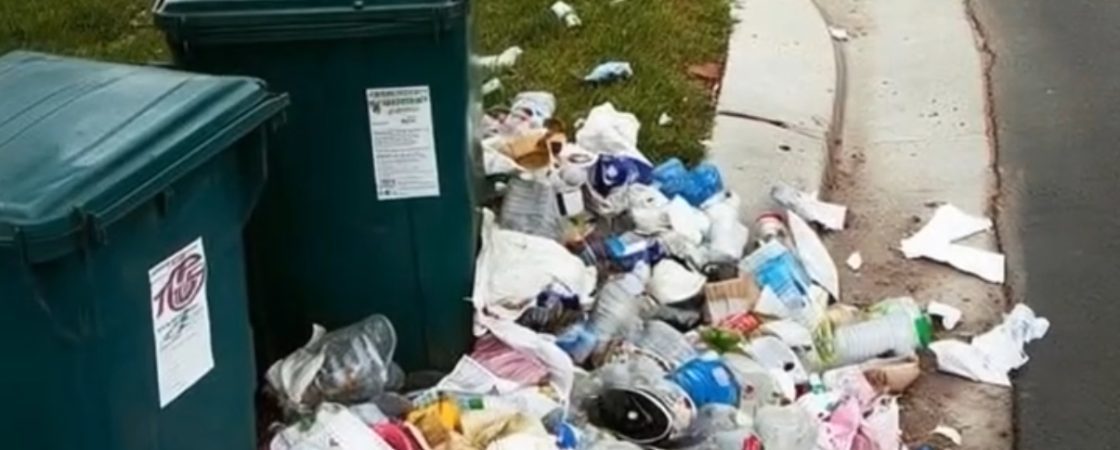When my husband passed away two years ago, I thought the hardest battles were behind me.
Raising three boys—ages 14, 12, and 9—alone wasn’t easy, but we found a rhythm.
We shared chores, kept the garden lively, and leaned on each other for strength.
Life was finally starting to feel manageable again—until my neighbor started his nonsense.
He was a 65-year-old man living alone across the street, and for reasons beyond me, he had decided my trash bins were his enemy. Every trash day, like clockwork, I’d find them overturned, their contents scattered across the street. The HOA had fined me THREE TIMES already, and I had no one to back me up.
I caught him in the act one morning. Standing at the window, coffee in hand, I watched as he strolled over, tipped the bins with one swift motion, and scurried back into his house before I could even grab my shoes. It wasn’t a stray dog or a gust of wind. It was him.
Furious, I stormed outside, ready to knock on his door and give him a piece of my mind. But as I raised my fist to knock, something stopped me. His blinds were drawn, and the porch was eerily quiet. So, I decided to teach him a lesson about politeness.
That weekend, instead of confronting him, I did something unexpected. I baked a loaf of banana bread—my husband’s old recipe, the one he swore could fix any mood. I wrapped it in foil, tucked a sticky note on top that read “From across the street—hope today’s a better day,” and left it on his doorstep.
No name. No return address. Just a gesture.
For two weeks, he didn’t touch the trash bins. I thought maybe that was it—maybe kindness had worked. But on the third week, the bins were knocked over again, and this time, one of the lids was cracked. That was the last straw.
I went over that afternoon and knocked for real.
He answered slower than I expected. His face was pale, eyes sunken. I noticed his hands trembling slightly.
“You need something?” he asked, voice rough like gravel.
“Yeah,” I said, holding back my frustration. “I need you to stop knocking over my bins. The HOA’s fined me three times. I have kids. I can’t afford this.”
He stared at me for a second, and then said flatly, “Your bins block the sidewalk. People walk here. It’s a hazard.”
I blinked. “They’re on the curb. Like everyone else’s.”
“You got three of them. Too many.” Then he shut the door.
I walked home fuming. But later that evening, my oldest, Bram, knocked on my bedroom door and said, “Mom, I think Mr. Rowley’s sick.”
That was the first time I realized—I didn’t even know his name. Mr. Rowley.
“He’s been out front coughing for like ten minutes,” Bram said. “Just standing there with a towel on his shoulder.”
I peeked through the blinds. He was standing on the porch with what looked like a soiled towel, leaning over the railing, coughing so hard I thought he might fall over.
I told the boys to stay inside, grabbed a mask, and walked over.
“You okay?” I called from the sidewalk.
He didn’t answer right away. Then he muttered, “Not really.”
I ended up calling an ambulance. Turned out, Mr. Rowley had pneumonia. He lived alone, no family nearby. Apparently, his daughter used to live three hours away but hadn’t spoken to him in years. He hadn’t been to the doctor in months and had just… given up. That towel on his shoulder? He’d been trying to hide how often he coughed up blood.
When he got discharged four days later, he had a note taped to his door: “Thanks for calling the ambulance. I’m sorry about the bins.”
The next few months changed everything. My boys started taking his trash out for him every week. They’d bring his newspaper to the porch and leave him homemade soup in mason jars. I started talking to him more too. He wasn’t a bad guy. Just lonely. Angry. And grieving, though he never said it outright.
Apparently, he lost his wife five years ago. She used to love feeding the stray cats around the neighborhood, and he still leaves food out even now. The sidewalk thing? She used to walk with a cane, and he’d yell at people who blocked the path, even after she passed. Some habits don’t leave a person easy.
By spring, we were waving at each other like old friends. When I hosted a small Easter barbecue for the boys and some neighbors, Mr. Rowley showed up with a six-pack of root beer and a homemade carrot cake. Everyone was stunned.
One of the new neighbors asked how we became friends, and Mr. Rowley just chuckled and said, “She taught me about banana bread, and I guess I owed her a few hundred trash bags.”
Here’s the thing: people don’t always act out because they’re bad. Sometimes, they’re just hurting in ways we can’t see. I could’ve fought back with more fines or passive-aggressive notes, but a little kindness cracked something open that anger never could.
Don’t get me wrong—boundaries matter. But grace? It goes a long way.
If you’ve got someone difficult in your life, maybe there’s a story behind their behavior. Doesn’t mean you excuse it—but maybe try understanding it.
You never know whose life you might change just by showing up.
❤️ If this story made you smile, like it and share it with someone who needs a reminder: kindness still matters.
